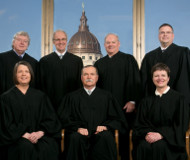Article from: www.thenewspaper.com/news/51/5113.asp
12/27/2016
Kansas Supreme Court Throws Out Search Ruse
Pleasant conversation during a roadside traffic stop does not make police detention voluntary,
Kansas Supreme Court ruled.
 Police often employ tricks to convince motorists stopped for minor traffic offenses to consent to vehicle searches. The Kansas Supreme Court said on Friday that these tactics were unacceptable in the case of Gerald E. Cleverly Jr, who was a passenger in a pickup truck pulled over in El Dorado on January 30, 2012.
Police often employ tricks to convince motorists stopped for minor traffic offenses to consent to vehicle searches. The Kansas Supreme Court said on Friday that these tactics were unacceptable in the case of Gerald E. Cleverly Jr, who was a passenger in a pickup truck pulled over in El Dorado on January 30, 2012.
Chris Jones was driving the truck without a seatbelt, so Officer Brent Michael Buckley saw a chance to write a ticket. Another officer, Sam Humig, pulled up to the scene and began questioning Cleverly. Meanwhile, Jones, the driver, had no proof of insurance on him, so Officer Buckley ordered him out of the truck ostensibly so he could issue him a ticket. He told Officer Humig that his larger motive was to "attempt a consensual search of the vehicle, after giving Jones the citation."
Officer Buckley conducted a patdown search and asked Jones "a few questions." Eventually, he talked Jones into granting consent to the search. He found a meth pipe. Cleverly was also subjected to a patdown search, but nothing was found. The officers asked to search cigarette packages that they had found, and after Cleverly agreed, they found the methamphetamine that had been hidden inside. Cleverly was sentenced to eighteen months' probation. Cleverly appealed on the grounds that he had been illegally detained for eighteen minutes without probable cause. The state Court of Appeals upheld the conviction, by declaring his presence "voluntary."
"The passenger's presence becomes voluntary or consensual once the driver gives consent or voluntarily remains on the scene after the traffic stop concludes," the appellate court declared.
The high court rejected this notion as illogical.
"The driver's waiver of his own Fourth Amendment rights by consenting to a voluntary encounter and consensual vehicle search cannot, as a matter of law, be deemed a waiver of the passenger's personal Fourth Amendment rights," Justice Lee A. Johnson wrote. "If Cleverly's continued presence at the scene of the investigatory detention had transformed into a voluntary encounter, the change must have been based on Cleverly's own individual acts and personal circumstances."
Officer Humig had ordered Cleverly to stand at the patrol car. He was not allowed to make a cell phone call. At trial, the officers insisted that this was nothing other than a pleasant roadside conversation.
"An officer who tells a person to exit a vehicle, puts hands on that person without consent, and directs the person to stand in front of the patrol car has not signaled to that person that he or she is totally free to disregard the officer's questions, decline the officer's requests, or otherwise terminate the encounter," Justice Johnson wrote. "Those detention indicators are not trumped by congenial conversation during the prolonged encounter."
The justices found that from the moment Cleverly received the unlawful patdown search that he was being illegally detained. The high court slammed the appellate panel for noting the patdown was "technically illegal" but stating it was for a valid purpose.
"The individual rights assured to all citizens through the Bill of Rights of the United States Constitution are not inconvenient technicalities designed to irritate governmental agents," Justice Johnson wrote. "Indeed, we have the unusual case in which the record includes an officer's statement of the purpose of the unlawful detention of the passenger, which was to attempt to extract the driver's consent to search the vehicle. Attempting to get the driver to waive his constitutional rights is no justification for violating the passenger's Fourth Amendment rights."
In light of the lawless behavior of the police, the high court reversed the lower court rulings.
A copy of the ruling is available in a 150k PDF file at the source link below.
Source: Kansas v. Cleverly (Kansas Supreme Court, 12/23/2016)
Permanent Link for this item
Return to Front Page
 Police often employ tricks to convince motorists stopped for minor traffic offenses to consent to vehicle searches. The Kansas Supreme Court said on Friday that these tactics were unacceptable in the case of Gerald E. Cleverly Jr, who was a passenger in a pickup truck pulled over in El Dorado on January 30, 2012.
Police often employ tricks to convince motorists stopped for minor traffic offenses to consent to vehicle searches. The Kansas Supreme Court said on Friday that these tactics were unacceptable in the case of Gerald E. Cleverly Jr, who was a passenger in a pickup truck pulled over in El Dorado on January 30, 2012.